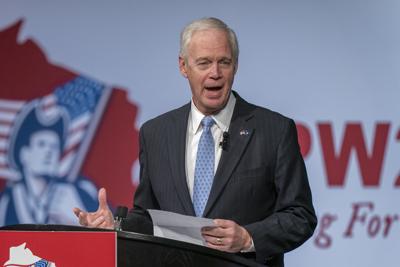Wisconsin Sen. Ron Johnson voted last week to block passage of the Inflation Reduction Act, the modest proposal to tax corporations a bit more fairly and use the money to expand access to health care and address climate change. No surprise there. Johnson’s against fair taxation, he’s never shown much interest in meeting human needs and he could care less about the planet. In other words, he’s a Republican partisan not unlike the other sorry members of Senate Minority Leader Mitch McConnell’s wrecking crew caucus.
But Johnson stood out as the cruelest member of that caucus when he broke with chamber’s Democrats and even a number of his fellow Republicans to bitterly attack an effort to ensure that people with diabetes could afford life-saving insulin.
Displaying the venomous dishonesty for which he has become known, Johnson dismissed the concerns of millions of Americans who were pleading for federal intervention to prevent drug company price gouging.
This is about much more than Johnson’s opposition to the Inflation Reduction Act, which was approved by Senate Sunday. It is about the toxic politics the senior senator from Wisconsin practices, a brand of politics that marks him as one of the cruelest partisans in American politics.
What’s important to understand is that the Inflation Reduction act is a compromise proposal that rational Republicans could and should have supported. It's a dramatically scaled-down version of the ambitious Build Back Better agenda that the Biden administration proposed last summer, when the White House outlined a plan to invest more than $3 trillion over the course of a decade in education, health care, caregiving and the work of saving the planet from climate change. That proposal was thwarted by unified Republican opposition and the machinations of corporate-aligned Democratic Sens. Joe Manchin of West Virginia and Kyrsten Sinema of Arizona.
On balance, we agree with the assessment by Sen. Bernie Sanders of the measure, which cleared the Senate Sunday when a 50-50 tie vote was broken by Vice President Kamala Harris.
The Vermont independent voted for the legislation and summed up the positives that made it worthy of support: “At a time when we face the existential crisis of climate change the most significant part of this bill is an unprecedented $300 billion investment in clean energy and energy efficiency, including a $7 billion solar roof top proposal that I introduced. This bill could help increase U.S. solar energy by 500% and more than double wind energy by 2035. That is no small thing. This bill also begins the work of making the wealthy and large corporations pay their fair share in taxes by imposing a 15% minimum tax on corporations. It also gives the IRS the resources they need to pursue the estimated $1 trillion in taxes not paid by the wealthiest people in this country, and will help ordinary, working people get their returns faster. This legislation also takes a small step in dealing with the outrageous prices of prescription drugs. Finally, we are giving Medicare the power to directly negotiate prescription drug prices with manufacturers on behalf of beneficiaries. Unfortunately, that provision does not kick in until 2026 and starts with only 10 drugs.”
Sanders acknowledged that, while it was a step forward, “This reconciliation bill goes nowhere near far enough in addressing the problems facing struggling working families.”
The senator tried to make the bill better by adding well-crafted amendments. But he never stood a chance of succeeding, even when the proposed ideas were immensely popular, and immensely necessary.
Why? Because Republican senators such as Johnson put political gamesmanship ahead of doing right by their most vulnerable constituents. They simply did not want to give Biden and the Democrats a win. That was disgusting but predictable.
What was unpredictable was the depths to which Johnson would sink during a last-minute debate about placing a $35-a-month cap on out-of-pocket costs paid for insulin by Americans who rely on private insurance. Democrats included the cap in the original version of the Inflation Reduction Act. The Senate parliamentarian ruled that the proposal was not compliant with the rules of the reconciliation process. To keep the cap in the bill, Democrats needed the votes of 10 Republicans. They got seven, including those of relative moderates such as Susan Collins of Maine and Lisa Murkowski of Alaska, as well as hardline conservatives such as Josh Hawley of Missouri. But they fell short of the 60-vote threshold needed to preserve the insulin price cap.
That should have been the end of it. But Johnson, who opposed efforts to save the cap, then began spewing venom. “Lying Dems and their friends in the corporate media are at it again, distorting a Democrat ‘gotcha’ vote,” growled the Republican from Wisconsin. “In reality, the Dems wanted to break Senate rules to pass an insulin pricing cap instead of going through regular order. They put this in a bill it wasn't allowed in, all for show.”
It wasn’t a "gotcha" vote. In was a sincere effort to save lives by making sure that people with diabetes don’t have to ration insulin. Seven Senate Republicans recognized that reality. But Johnson still went on the attack.
Johnson’s the liar. And in this case he’s the cruelest of all liars — a political careerist who claims that an effort to save lives is “all for show.”
Johnson’s the one putting on the show. It’s time for the voters of Wisconsin to cancel him.






